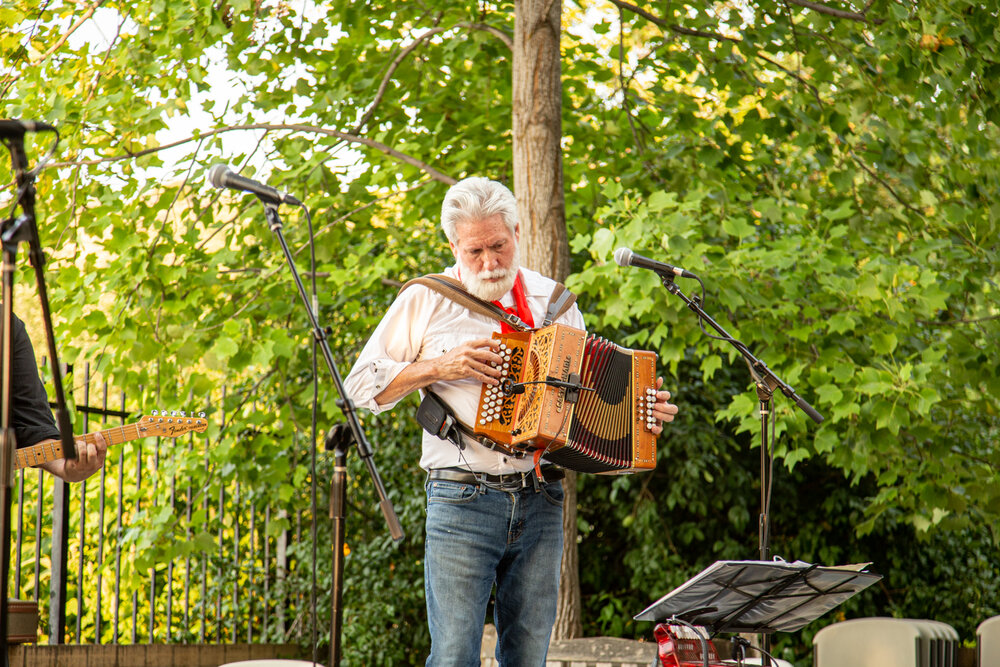Boise State Public Radio (part of the NPR network) has published an article by Arlie Sommer discussing the power of music and dance as integrating elements of the Basque community in that part of the world.
In the text and audio broadcast by the station, we can find “old friends” to the readers of this blog, from Pat Bieter, the “German Catholic from Milwaukee” who married a Basque woman and became one of the leading figures of the Basque community in Boise, to the Basque dancing troupe Oinkari, which shares this essential part of our culture in the Boise area. Following along that series of events, we’ve eve got actor Bill Petersen (who played Grissom on “CSI: Las Vegas”) who studied in Oñati, in Gipuzkoa.
But in this article, the main focus in on a couple that seems to have been together forever: Dan Ansotegui and his accordion. This relationship, between Ansotegui and his instrument, was also born in Oñati, in a group put together by Pat Bieter.
He’s also been a regular visitor to our blog, thanks both to his being a part of the Basque-American music group “Amuma Says No“, and for having received the National Heritage Fellowship (NEA), an award given out since 1982 to traditional music artists by the National Endowment for the Arts.
The whole interview is very interesting, but perhaps what we most enjoyed, where we felt most represented, was in this statement by Ansotegui:
“I think that’s kind of what Basques have been really good at, is keeping their culture and yet allowing it to change and still remain Basque.“
Basque culture, and the Basque nation, still exist thanks to their ability to assimilate and “Basque-ify” what is brought into it; the exact opposite of what those who would like to see our culture and nation be assimilated and “disappeared” want. Our ability to continue on so well is because we are not impervious to other realities, nor are we enemies of those who wish to join us and become one of us. Indeed, the key to our success, to the reason why we’ve survived the ups and downs of history and the rise and fall of other cultures and nations is that we are able to adapt and take in what outsiders bring into our culture and make that our own. This has allowed us to prove what all those doomsayers who predicted our disappearance completely and utterly wrong.
This was told to us from a position of “affectionate resignation” by Élisñee Reclus, which we’ve discussed at length on the blog, and in terms that were much less kind, by the likes of Friedrich Engels:
“There is no country in Europe which does not have in some corner or other one or several ruined fragments of peoples, the remnant of a former population that was suppressed and held in bondage by the nation which later became the main vehicle of historical development. These relics of a nation mercilessly trampled under foot in the course of history, as Hegel says, these residual fragments of peoples always become fanatical standard-bearers of counter-revolution and remain so until their complete extirpation or loss of their national character, just as their whole existence in general is itself a protest against a great historical revolution.
Such, in Scotland, are the Gaels, the supporters of the Stuarts from 1640 to 1745.
Such, in France, are the Bretons, the supporters of the Bourbons from 1792 to 1800.
Such, in Spain, are the Basques, the supporters of Don Carlos.
The next world war will result in the disappearance from the face of the earth not only of reactionary classes and dynasties, but also of entire reactionary peoples. And that, too, is a step forward.”
But we are not reactionary, and we have not disappeared. We’re still around, with a bright future ahead: both and home and abroad, as part of the diaspora around the world to which we owe so much.
Boise State Public Radio – 24/9/2020 – USA
The Basque Accordion Builds Community In Idaho
From music, to food, to Boise’s Basque Block and the Jaialdi Festival, to the Trailing of the Sheep in Ketchum, Basque culture plays a big role in southern Idaho and Dan Ansotegui has played an important role in promoting that. Ansotegui teaches the traditional Basque push button accordion music that accompanies many of these community events.
(Follow) (Automatic translation)
Last Updated on Dec 20, 2020 by About Basque Country





